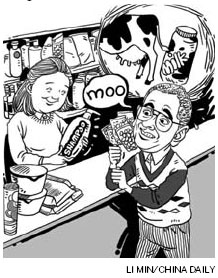I arrived in Hohhot, Inner Mongolia, in 2003 to teach English at a university, armed with a few Chinese words: ni hao, xie xie and zai jian (hello, thank you and goodbye).
My Chinese friends in Canada had assured me that I would find numerous individuals who could communicate in English. Unfortunately, I only encountered a few who spoke English in the early years of my stay in China. It was hard to understand them; they had a big vocabulary, but didn't pronounce the words correctly. I had to rely on body language to get around.

Buying groceries often got me into the most hilarious situations. Imagine a foreigner standing in a small store making the sound "moo, moo" and putting his hands on top of his head, then squeezing his hands. Everyone would come to the conclusion that I was trying to buy milk, I thought.
However, the store assistant smiled and went to the back rows, then re-emerged with a bottle of shampoo. I left the shop laughing my head off.
In another store, I made the sound "bug, bug" and bent down, pushing, then made an oval shape with my hands.
The young lady smiled and showed me the way. I followed happily, believing I had finally found someone who could understand me. It turned out she was leading me to the washroom instead of fresh eggs.
These incidents prompted me to find my own food before I could master more words in Chinese.
While exploring my new city, I encountered many interesting signs. One sign on the window of a pharmacy said, "free drugs". Another on a restaurant window read: "Come in, we will pizza you."
The hilarity of the linguistic missteps has also won me friends. Upon arriving at the airport, I found representatives of the university waiting for me. After an exchange of greetings, one of them said: "Now, we will house you in nice apartment."
I couldn't help correcting him: "You will take me to my nice apartment." They just smiled, perhaps too polite to share a laugh with me.
My supervisor at the university, a kind lady, was eager to improve her English. I asked her to write down her daily activities in English. One day, her notes read: "Yesterday, I disciplined my sun." As usual, she seemed irritated at my laugh, possibly thinking that I was making fun of her.

"If you can discipline the Sun, you don't need my help to teach you English," I explained.
Fortunately, she got used to my sense of humor and retorted: "I can discipline both my son and the Sun."
One day, she surprised me again, saying: "Today, I am inviting you for a snake."
"If you are inviting me for a snake, I must refuse, as snake is never on my menu," I replied. "But if you are inviting me for a snack, I would love to munch on a snack."
"We will have a snake for a snack," she said laughing.
The misinterpretation of English has also brought embarrassments. I became friendly with a restaurant waitress and told her: "I really like you." She soon treated me differently, giving me adoring looks.
I realized that she might have misunderstood my words, so I explained that there is a big difference between "I like you" and "I love you". She was very angry at first. Fortunately, my sincerity won her back and we are still good friends.
|
|
|
|
|
|
|
|
